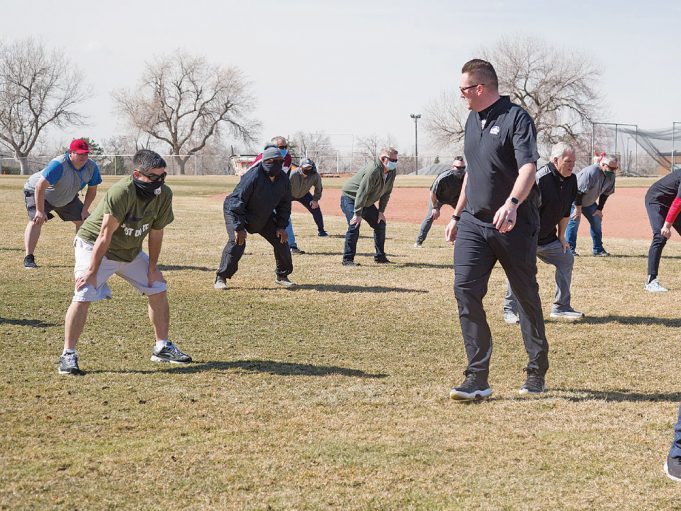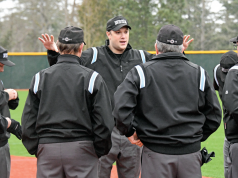In my time as a minor league and collegiate umpire and supervisor, I was often asked what umpires should do to move up the ladder.
First, a dose of reality. Many umpires with strong skill sets will never get to whatever level they aspire. Where one lives may be a factor. The league in question may have no openings. Fair or not, one’s age or size may come into play. Other factors may enter into the equation. I’ve often said who advances can be as serendipitous as where lightning strikes. All we can do is prepare and package ourselves as best we can so that if an opportunity arises we’re ready to take advantage of it.
Appearance
I won’t dwell on this topic because this magazine gives it a lot of attention. Suffice it to say if I’m considering several people of relatively equal talent for a staff opening, it’s easy to dismiss those who aren’t trim and don’t look like they’ve played the game. Maybe this isn’t fair, but it’s reality today. Look at MLB, NFL, NBA, NHL and college sports officials and, except for a few veterans, all you’ll see are people with 2 percent body fat. Appearance means a lot.
Don’t wear uniforms that are sloppy or don’t fit. And don’t do stupid stuff like come to the park with the logo of a school in the league on your car or equipment bag or drink adult beverages if you’re wearing something that identifies you as an umpire.
Don’t be too eager
More so today than in yesteryear, some umpires want to advance before they’re ready. Take things one step at a time; you’ll benefit in the long run.
As a supervisor, one thing I focused on when watching umpires was whether they could maintain a solid, consistent strike zone throughout the game, regardless of what happened. It takes roughly five years to develop such a zone at whatever level you’re working. I also wanted to see how an umpire managed the game and whether he or she could turn the page after blowing a call or being hooted at. We can’t master this overnight. If you get an assignment at the next level but screw up because you’re ill-prepared, you may not get a second chance.
If working higher-up scrimmages is an option, do it. Balls and strikes are where it’s at, so get behind the plate. Be objective about your work; maybe ask for feedback afterward. Although it’s not a pressure situation, this should give you a sense of whether you’re ready.
Network
People won’t knock at your door asking you to umpire. You must put yourself out there if, objectively, you think you’re ready to advance. Submit letters of interest to the right people. If umpires you know can help, let them know of your interest. Go to camps and clinics. Caution: If you do, don’t even hint that you’re there to advance rather than to learn. And don’t be a suck-up. Popular belief to the contrary, most supervisors and assigners have no use for this.
Sound out veterans
Some veterans may not look the part or be on top of rules or mechanics, but they know things that PowerPoint presentations don’t teach. If you get a chance to soak up their wisdom, take it. Incorporate what you like into your repertoire and discard the rest. When I started out I learned as much from the old heads as I did in clinics.
Social media
Today there are all kinds of internet chat rooms, podcasts, video clips from games, etc. They can be a great resource for the do’s, don’ts, what-if’s, etc., involved in umpiring at any level. But sift through the information carefully. What works for umpires at one level may not be appropriate for others.
Be humble
Don’t gripe about assignments. Other umpires may be as good as you are. Take constructive criticism without protest; it can be a career-killer to be branded as the person who always has a comeback when someone in authority tells them something. Don’t turn back games unless you must. Being a headache to assigners gives them an easy excuse to skip over you when the plum games come around.
Call strikes
No one likes a walk parade, so call marginal pitches strikes, especially at the bottom of the knees (not shins) and on the corners. Don’t get hung up on how the catcher presents the ball. You can’t ring up strikes if they make a pitch look really bad, such as by falling to the ground to catch it, but otherwise don’t penalize a pitcher for subpar mitt work. Pro catchers are adept, but those in amateur ball generally aren’t.
I always said that when a pitch left the pitcher’s hand, I assumed it was a strike unless it convinced me otherwise. You won’t advance with a coffee-can-sized strike zone.
Don’t get lax
Work as if someone who can help you is watching. A highly regarded MLB umpire of yesteryear was first noticed in a Little League game by the head of the Umpire Development Program, who suggested he go to umpire school. Conversely, an official in my local chapter loafed in a scrimmage, only to learn afterward that a college coordinator was there. His comment: “If I’d known you were here I would have hustled more.” Guess who never got hired by that coordinator?
Take care of business
Know the rules, apply them in light of their intent and follow the prescribed mechanics. Have the guts to do what’s right even if you get yelled at. Hone your communication skills. Manage the game without being confrontational; you won’t earn people’s respect otherwise. Have your partner’s back. If he ejects someone, don’t chicken out and let him handle the aftermath. That’s happened to me, and it wasn’t pleasant in the locker room afterward.
Integrity
Don’t trash-talk other umpires to an assigner or anyone else. It will likely come back to haunt you. If you screw up, own it. An umpire on my staff once called me after a game to say he ejected a coach when he shouldn’t have. That earned plus points with me.
Jon Bible, Austin, Texas, worked seven NCAA Division I College World Series. In 2019, he was inducted into the National College Baseball Hall of Fame in Lubbock, Texas. *
What's Your Call? Leave a Comment:
Note: This article is archival in nature. Rules, interpretations, mechanics, philosophies and other information may or may not be correct for the current year.
This article is the copyright of ©Referee Enterprises, Inc., and may not be republished in whole or in part online, in print or in any capacity without expressed written permission from Referee. The article is made available for educational use by individuals.


















